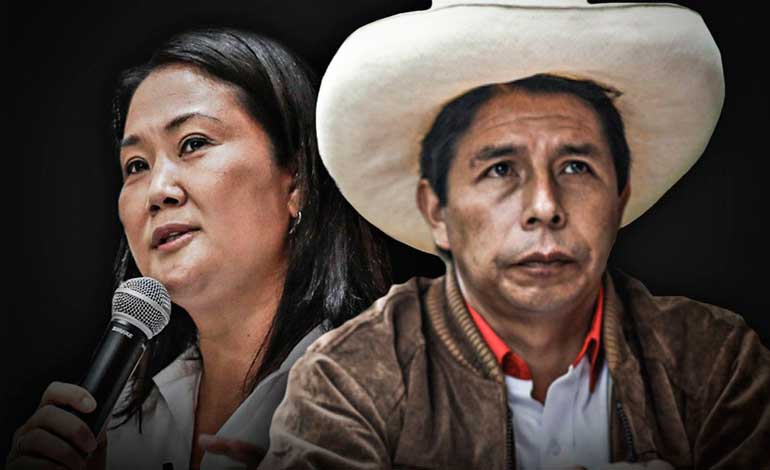RIO DE JANEIRO, BRAZIL – The passage to the second presidential round of the ultra-left professor Pedro Castillo and the authoritarian right-wing Keiko Fujimori has led Peruvians from bewilderment to polarization, facing a decision that next June 6 may leave an indelible mark on the future of their country.
In the citizen debate, so polarized that it quickly turns to insults, some positions assure that Peruvians are between a rock and a hard place. In the second round, they face the extreme dilemma of choosing “between cancer or AIDS.”

With different arguments and nuances, his opponents consider Castillo a Marxist with “undercover” radical ideas in a country where the violent shadow of the ‘Shining Path’ (Sendero Luminoso – The Communist Party of Peru) is still very much alive and is a weapon for political discredit. At the same time, Fujimori has been linked to the systematic corruption and human rights violations that, for many, represent the regime of her father, Alberto Fujimori (1990-2000).
Castillo rejects being “terruqued,” a term used in his country to discredit anyone with progressive or leftist ideas. At the same time, Fujimori maintains that despite defending his father’s “legacy,” he will fight against corruption and respect democratic rules during an eventual government.
This election will also be historic because it will designate the “president of the bicentennial” of the country’s independence, celebrated precisely on July 28, the same day the new president takes office.
TWO DIAMETRICALLY OPPOSED CANDIDATES
“It is going to be a very polarized second round, regardless of what the candidates do,” said analyst Eduardo Dargent, who predicts that during the campaign of a little more than a month, “many simplifications” will emerge at a social level.
Political scientist Gelin Espinoza agreed that it would be a campaign “with a lot of polarization,” in which the media “play a vital role,” given what she considered “a discourse clearly in favor of a certain candidate,” in this case, Fujimori.
“They recognize that she is ‘the lesser evil,'” Espinoza said about the position also expressed by writer Mario Vargas Llosa, who has asked to vote for Keiko despite being a staunch detractor of Fujimorism during the last decades.
After the general elections of last April 11, the two candidates are still outlining the details of their campaign for the second round with their work teams. Still, it is undeniable that their proposals are opposed.
Castillo is a teacher born in 1969 in the northern region of Cajamarca, who in 2017 led the strike of a faction of the teachers’ union that authorities linked to Movadef, the political arm of Sendero. However, he rejects any closeness to that grouping and defends his regional and peasant roots.
On the other hand, Fujimori was born in Lima in 1975 and defended his father’s regime to the hilt, despite the sentences he has received for human rights violations and corruption and directly facing accusations of this type, including a 30-year prison sentence against him.
BETWEEN “ANTI-FUJIMORISM” AND “ANTI-LEFTISM”
In this context, Espinoza considered that in the second round, there would be a dispute between “anti-fujimorism” and “anti-left” of large sectors of the population, something to which the candidates could either “ignore” and continue appealing to their bases or “try to cede their positions a little and moderate their speeches” to seek the vote of the undecided.
“We still have a large percentage of undecided who they will try to convince,” she remarked before recalling that a last poll by the Ipsos company 55 % of citizens said they would not vote for Keiko, which shows that “the anti-Fujimorism in Peru is quite deep-rooted, but we also know that the anti-left is also quite deep-rooted.”
For the analyst, it has to be “understood that the elections will not be won in Lima” because the position in the capital will be “only one more point to take into consideration” since, in the first round, Castillo achieved the bulk of his support in the provinces.
Referring to the campaign ahead, Dargent considered that Castillo “what he is going to try to do, without renouncing his issues, is to calm down” his compatriots and “say that he is coming to make demands and not to be a boogeyman.”
“And Keiko Fujimori is going to try to detach herself from that vote of the A and B sector that favors her at this moment,” he added before reiterating that “the polarization is going to happen because of what the candidates themselves are going to do concerning their rival and it is going to be very strong at a social level.”
For the analyst, the political situation faced by his country will lead to “the scenarios that open after July 28 will be marked by this polarization”.

